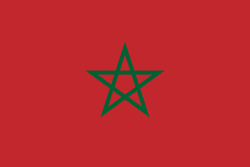Corruption in Morocco , both petty and grand, is a growing problem within the nation. A leaked report by a US diplomat stated in 2009 that corruption had become much more institutionalized under King Mohammed VI, and that the royal family had been using public institutions to coerce and solicit bribes. [1]
Contents
On Transparency International's 2024 Corruption Perceptions Index, Morocco scored 37 on a scale from 0 ("highly corrupt") to 100 ("very clean"). When ranked by score, Morocco ranked 99th among the 180 countries in the Index, where the country ranked first is perceived to have the most honest public sector. [2] For comparison with regional scores, the average score among Middle Eastern and North African countries [Note 1] was 39. The highest score among Middle Eastern and North African countries was 68 and the lowest score was 12. [3] For comparison with worldwide scores, the average score was 43, the best score was 90 (ranked 1), and the worst score was 8 (ranked 180). [4]
Corruption is also identified by businesses as a large obstacle for investment in Morocco. Public procurement is an area with a high level of corruption, and government contracts are often awarded to well-connected companies. Corruption committed by highly influential persons is rarely prosecuted. [5]
